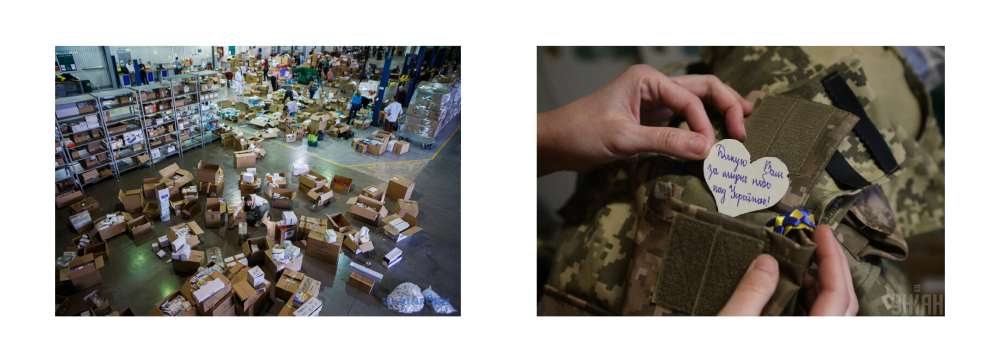Businesses Battle War
How the war in Ukraine is shaping businesses
“One second, there’s an air raid siren, can’t hear you.”
Hearing one of my colleagues utter these words is not something that is typical for business jargon. This coworker is used to high-pressure situations, having worked in advertising and production for years. Now they are taking calls from trains, working in bunkers, and catching Zoom meetings from foreign lands.
The night before Russian aggression began its terror on February 24th, many people were thinking of how their next workday would look – catch up on tasks, join some meetings, maybe hit the gym after work. After years of being locked in due to the pandemic, it was a nice return to the routine and normal rhythms.
But that morning changed everything. Now, instead of worrying about client deadlines, workers and companies alike were wondering where to safely relocate themselves and their families. Adding to the strain is the uncertainty over how their business will adapt to the war landscape and how they can remain solvent and inspired.

Prepared
If there’s one thing the pandemic has taught us, it’s how to be agile and resilient in a crisis situation. We shifted from coffee break catch-ups to isolation, from office board meetings to Zoom calls. We learned how to manage workflow while running a household, home-schooling, and living under the stress of unknown timeframes and seclusion.
Clearly, the stress of the pandemic cannot compare to that of missiles, but it did prepared Ukraine up for the ability to keep working under abnormal conditions, giving us an ‘advantage’, if you will, of knowing how business can be continued even if we are not physically present. Since the beginning of the war, more than 8 million Ukrainians have fled from their country and dispersed throughout Europe and elsewhere abroad.
This takes remote working to a whole other level. While relocating to safer countries, many had to halt projects they were inches from completing and were often placed in areas of spotty internet connection and crammed into shared spaces, making it challenging to accomplish their daily tasks. While businesses dependent on in-person commerce, like restaurants and department stores had to shut down, much of the IT and tech sector was luckily capable of continuing, as most of their business came from external clientele.

Helping Beyond Donations
Westerners are wondering how they can assist beyond delivering supplies, sending weapons, and sheltering refugees. One essential option is often overlooked: giving work to Ukrainian enterprises and contractors to help alleviate the economic catastrophe. Enlisting services from a war-torn country with devastated cities and millions of migrants may seem paradoxical, but there are compelling reasons to do so.
Before the war Ukraine had positioned itself as a top offshore contender for all things media and design and had rapidly progressed from a low-cost outsourcing destination to a center for higher-value-added work. Its English-speaking programmers are familiar with European firms and are located in a nearby time zone, giving the industry a particular edge for clients in the European Union and the United States. The sector ranked first in Eastern Europe for outsourcing developers, first in Europe for the number of graduates from technical schools, and boasts clients like Google, Oracle, and Microsoft. Impressively, 77% of Ukrainian tech firms gained new customers since the beginning of the war.
Ukraine has earned the title of ‘Breadbasket of Europe’ and truly is the world leader in agricultural exports, with 71% (103 million acres) of the country sanctioned for farming and food production. Because Russia has stifled access to the Black Sea for such exports and damaged machinery and grain storehouses, the food chain supply is being disrupted with major consequences. Ukrainian agro-enterprises are finding ways to export through trains and trucks but are only able to export 57% of crops in June, leaving food vulnerable countries in a grave position and globally elevating prices at the grocery stores.

The Ukrainian government’s first objective is to relaunch the economy.
“The economy must be preserved and restored. … Pharmacies, trade, any business that can work. For the country to live. For the restoration of Ukraine to already begin.”, says Ukrainian president Volodymyr Zelensky, with promises to remove any barriers or obstacles to help companies.
With many people now having returned to bigger cities like Kyiv, his promise seems to be holding up. Many stores, restaurants, museums, and cafés are up and running with locals and even foreigners returning to enjoy the summer atmosphere. Impressively, 77% of Ukrainian tech firms gained new customers since the beginning of the war.
The Work is Never Done
In conjunction with working, the majority of Ukrainian employees assist the country’s war effort in whatever manner they can. Restaurants like the Kyiv-based Dubler Cafe and ZygZag have made generous contributions to the cause by cooking meals for the defenders, while also providing free food for those in need. The luxury department complex Tsum has taken all of the latest spring and summer fashions meant to be purchased by happy customers and donated essentials like coats and shoes to the army.Ukrainian construction groups and contractors like KAN Development have aided in rebuilding devastated areas and assembling anti-tank hedgehogs and other defense structures. Real estate investment firm DGY has facilitated the creation of the charity JforUA and, with combined efforts, has transported over 1,853 people from dangerous territories and relocated them to safer havens. Similarly, programmers at various digital and tech agencies have found themselves part of the factions of “IT Armies” using their coding skills to hack Russian systems and scramble information messages.

The core messaging and cause have also shifted for business. In the early days of the war, it was essential for Ukrainian (as well as outside) companies to take a staunch stance on the invasion. This ranged from logo colors to represent the UA flag, to global monoliths like Nike and McDonalds to halt all business dealings with Russia. In typical Ukrainian whit, the Ukrainian bank Pumb changed its log-on interface from ‘customer login’ to ‘customer login, unless you are Russian’. The most important thing for Ukrainian employees was to feel the support of their companies; many, like ours, helped their workers find safe accommodations and worked around erratic schedules and hours. The immense importance of knowing you have feasible income and backing from your company provides not only financial security but also necessary psychological assurance.
It is evident that Ukraine is a country of passionate people and unequivocal professionals. Their dreams and careers are an untouchable birthright that is not going to be squandered by terrorist occupiers. The camaraderie between colleagues that has been ignited because of the war is untouchable, making their resolve and career dedication all the more palpable.
It’s unknown what the long-term implications of the war will be, but one thing is for sure:
Ukrainian businesses are giving the ultimate middle finger to Russia: to thrive against the odds.
Want to support Ukraine and it’s economic rebuilding? Hire our team of Ukrainians who know how to fight and win.





